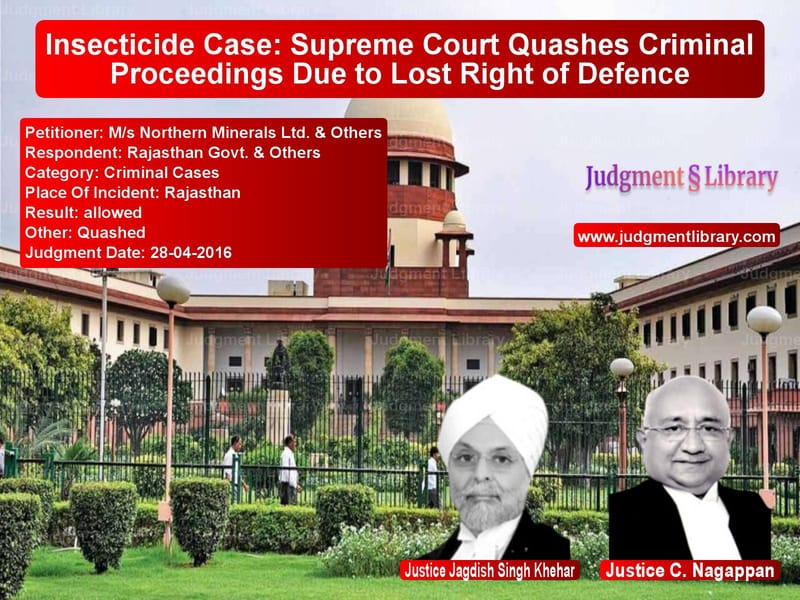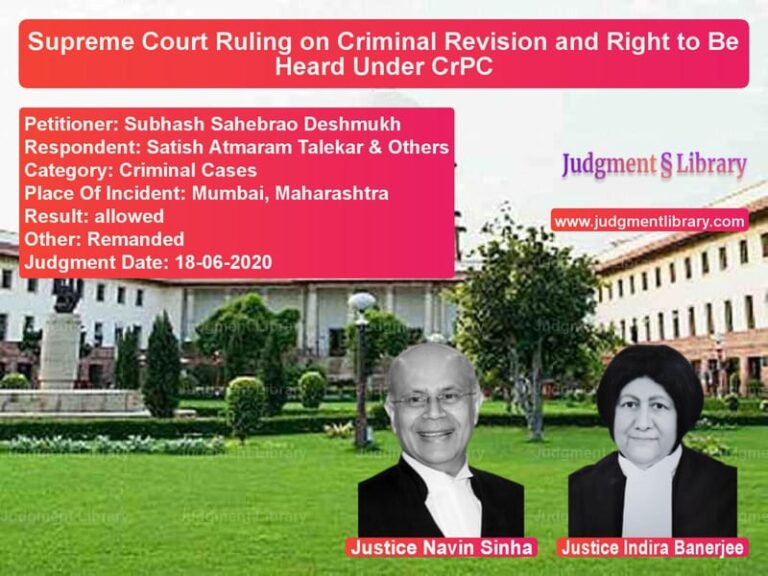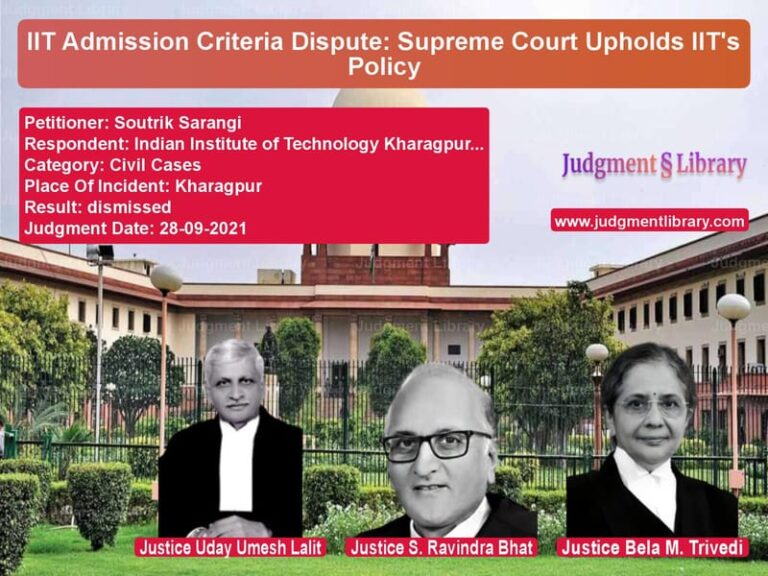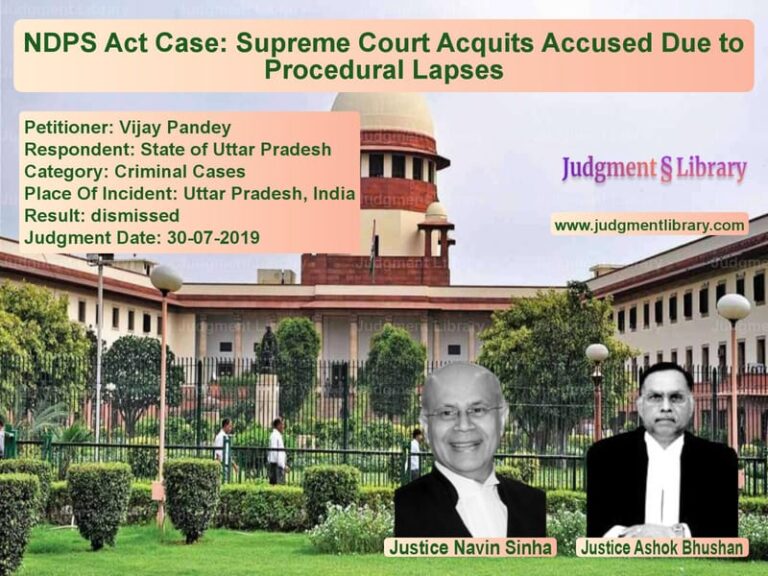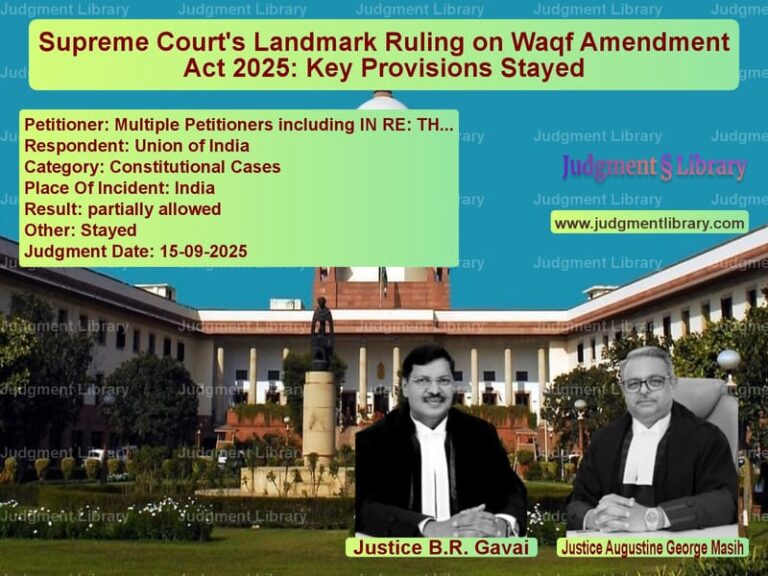Insecticide Case: Supreme Court Quashes Criminal Proceedings Due to Lost Right of Defence
The Supreme Court of India in Criminal Appeal No. 1034 of 2005 and related appeals addressed a crucial issue regarding the admissibility of evidence and the application of the Insecticides Act, 1968, in a case involving the alleged misbranding of insecticides. The case was filed by M/s Northern Minerals Ltd. & Others (Appellants) against the Rajasthan Government & Others (Respondents). The primary issue revolved around whether the appellants could challenge the analysis report of an insecticide sample after its shelf life had expired.
Background of the Case
The case began when the Insecticide Inspector seized a sample of Dimethoate 30% EC, manufactured by M/s Northern Minerals Ltd., on October 15, 1994. The sample was tested by the State Pesticide Testing Laboratory, which declared the sample misbranded. A show-cause notice was issued to the appellant company, but it responded by asserting that the product met the relevant ISI specifications. Despite this, the government proceeded to file a complaint under Section 29(1)(a) of the Insecticides Act, 1968, and the appellants were charged with misbranding.
Petitioner’s Arguments
The appellants contended:
- The sample’s shelf life expired in August 1995, and the analysis was done after the sample had expired, making the test invalid.
- The appellants had informed the authorities about their intention to adduce evidence to counter the findings of the Insecticide Analyst.
- The legal right to challenge the report of the Insecticide Analyst had been lost due to procedural delays and the expiration of the sample.
- Under the provisions of the Insecticides Act, the appellants had a right to have the sample re-analyzed by the Central Insecticides Laboratory.
Respondents’ Arguments
The Rajasthan Government argued:
- The sample was properly tested, and the report was valid.
- The appellants’ failure to seek the re-analysis of the sample within the prescribed time period meant they waived their right to challenge the test results.
- The expired shelf life of the insecticide did not invalidate the earlier analysis or the subsequent legal proceedings.
Judgment
The Supreme Court examined Section 24 of the Insecticides Act, 1968, which lays down the procedure for challenging the report of an Insecticide Analyst. The Court found that:
“Notification of an intention to adduce evidence in controversion of the report takes out the report of the Insecticide Analyst from the class of ‘conclusive evidence’ contemplated under sub-section (3) of Section 24 of the Act.”
The Court noted that the appellants had made a legitimate attempt to challenge the findings of the Insecticide Analyst, but due to procedural delays and the expiration of the sample’s shelf life, their right to have the sample re-analyzed had been frustrated. The Court emphasized that:
“An accused person must be allowed the right to rebut evidence, and the failure to allow this right would result in an abuse of the legal process.”
Additionally, the Court referred to the judgment in Northern Minerals Ltd. vs. Union of India (2010), which reinforced the principle that the right to challenge the Insecticide Analyst’s report is crucial for the defence:
“The legal fiction that the report of the Insecticide Analyst shall be conclusive evidence of the facts stated in its report loses its conclusive character once the accused notifies their intention to adduce evidence in controversion of the report.”
As a result, the Supreme Court ruled that the criminal proceedings against the appellants should be quashed. The Court observed that:
“By sheer inaction, the shelf life of the insecticide sample had expired, and for that reason, no step could be taken for its re-test and analysis by the Central Insecticides Laboratory.”
The Court concluded by setting aside the High Court’s ruling and quashing the criminal proceedings against the appellants. It emphasized the importance of allowing defendants to exercise their legal rights to challenge evidence, and in this case, the expiration of the sample prevented the appellants from doing so.
Key Takeaways
- Criminal defendants have the right to challenge evidence, and this right cannot be denied due to procedural delays or expired evidence.
- The expiration of the sample’s shelf life made the legal proceedings invalid, as it prevented the appellants from exercising their right to re-test the sample.
- The ruling underscores the importance of fair legal procedures and the right to a fair defence in criminal cases.
This judgment reinforces the legal principle that the criminal justice system must operate fairly, ensuring that no defendant is deprived of their right to challenge evidence due to technicalities.
Don’t miss out on the full details! Download the complete judgment in PDF format below and gain valuable insights instantly!
Download Judgment: Ms Northern Mineral vs Rajasthan Govt. & Ot Supreme Court of India Judgment Dated 28-04-2016-1741854765014.pdf
Direct Downlaod Judgment: Direct downlaod this Judgment
See all petitions in Fraud and Forgery
See all petitions in Contract Disputes
See all petitions in Judgment by Jagdish Singh Khehar
See all petitions in Judgment by C. Nagappan
See all petitions in allowed
See all petitions in Quashed
See all petitions in supreme court of India judgments April 2016
See all petitions in 2016 judgments
See all posts in Criminal Cases Category
See all allowed petitions in Criminal Cases Category
See all Dismissed petitions in Criminal Cases Category
See all partially allowed petitions in Criminal Cases Category

